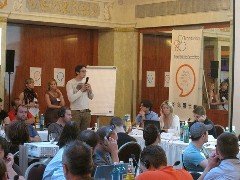A new citizens' pact for young Europeans
Faced with the uncertainty of the crisis
 The financial and economic crisis which has shaken Europe to its core, cannot be resolved only by accounting and fiscal measures to balance the budget. All European democracies are experiencing obvious and hidden social conflicts which decisively influence political consensus, often dividing political forces in a fairly clear-cut way. The basic question which is at the bottom of the European crisis is that of the intergenerational relationship. A question which, in its implications and dimensions, is without precedent in the history of the West.
The financial and economic crisis which has shaken Europe to its core, cannot be resolved only by accounting and fiscal measures to balance the budget. All European democracies are experiencing obvious and hidden social conflicts which decisively influence political consensus, often dividing political forces in a fairly clear-cut way. The basic question which is at the bottom of the European crisis is that of the intergenerational relationship. A question which, in its implications and dimensions, is without precedent in the history of the West.
From the end of World War II to today, Europe has experienced a great period of growth and economic and social development together with an equally extraordinary era of the establishment and spread of democracy and citizens’ rights. Millions of German, French, English, Italian, Dutch, and then also Spanish, Portuguese, Greek citizens have seen their well-being, their personal and family tenor of life increase. More recently, millions of Poles, Hungarians, Czechs, Romanians and Bulgarians have been added.
They have been able to live with a better health system, guaranteed education for their children and have enjoyed more balanced work conditions and increased rights. Most especially, the decision of governments to offer adequate guarantees for old age, with pensions (often rather advantageous compared to contributions during working years) for everyone, has given stability and cohesion to society. Some economists maintain that the motivation for this generosity was the constant temptation of ruling governments to make concessions with public spending in order to maintain electoral consensus.
Young people, instead, have seen their social influence decrease with these measures. Around one-third of young Europeans are not permanently inserted into the work world. A good part of those who have been inserted have rapidly seen their social prospects diminish. The coefficient of return on social security payments are, everywhere, diminished and the prospects for a secure pension and income, but also for health services, have become weak and uncertain. Maternity is not socially protected and there are no adequate incentives for families.
Little work, insufficient recognition of expertise for studies undertaken, weak social status and uncertain prospects: this is the scenario for many young Europeans. The picture is made all the more uncertain and confused by the rapid ageing of the population, the economic crisis which frightens the majority of the social body, the contemporaneous structural necessity of opening the doors of Europe to a real integration of several tens of millions of foreign workers.
Therefore, an epic challenge is placed before European governors and those of single nation states: how can the European social model be made viable for the youngest generations and even more, how to firmly transfer it to future ones? The real performance of Europe depends on these fundamental aspects, rather than on the spread of different government bonds.
Only the prospect of the creation of new wealth, in fact, can respond to the challenge. It is a challenge which can truly be overcome, if the problems are met with great clarity, explained to different interest groups and to the entire community, to all citizens. Unjust privileges in every sector must be cancelled and more intense measures of social justice must be proposed. A little more value must be placed on what we can do for others, according to our abilities. We must recover at least a little of the spiritual depth of the founding fathers of a common Europe, those illuminated but also fairly simple personalities who thought of politics as an intertwining of ideas and constant serious involvement of responsibility and citizen engagement.
Generations need to be integrated: a new pact for strengthening social and local community ties, within a framework of new European citizenship. Real recovery of development and competitiveness requires stronger social cohesion. In recent years, Europe has been uncertain and disconnected in the face of emerging challenges. Those countries in most difficulty have a duty to do more. It will take several years, but the moment has come to indicate the route and to share it. Politics must rediscover the courage to look far ahead, beyond the individual destiny of those who interpret it.
- Catholic schools understand that religious education is not just a subject; it is a way of being
- World Youth Day 2011 in Madrid: A Truly Spiritual Experience!
- Hunger for Life
- Youth Today - Who are They Realy?
- ‘Benedict XVI is a wholly authentic figure’
- Cleaning up pre-riot: Six ways to prevent a repeat of London scene
- 10 Things I Wish Someone Told Me Before I Became a Youth Minister
- Youth unemployment a terrible betrayal of next generation
- Looting - why not if you are a moral relativist?
- ‘Young people are presented not as individuals, but as a menacing plague’


 Votes : 0
Votes : 0









